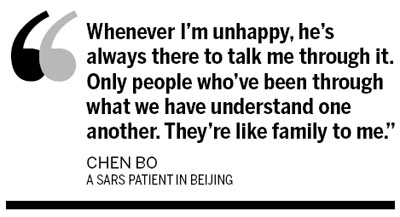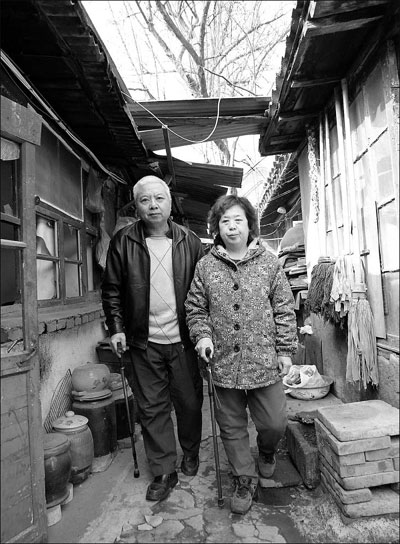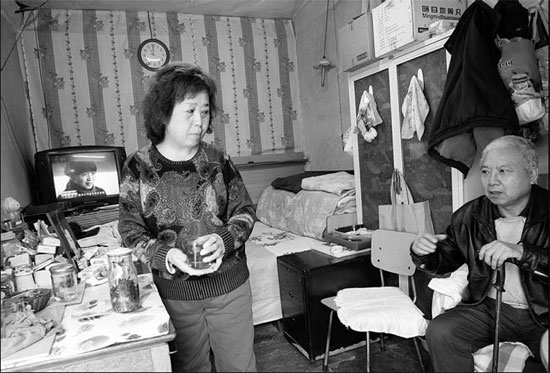Still hurting after it's over
Updated: 2013-03-06 07:52
By Sun Ye (China Daily)
|
||||||||
|
Though Li Chaodong and his wife Bao Baoqin survived SARS, they suffer leg pains caused by their hormone treatments. Photos by Zhang Wei / China Daily |
|
The couple lives in a two-room courtyard house in eastern Beijing. |
A family of SARS survivors explains the hardships of life after the disease. Sun Ye reports.
Editor's Note: Ten years ago, the world was hit by the Severe Acute Respiratory Syndrome (SARS) epidemic. Thousands lost their lives, including medical workers all over the world who selflessly looked after patients in spite of the high risks of infection. In China, the effects of the dreaded virus still reverberate to this day. In a series of reports, China Daily highlights the human faces behind the news.
Li Chaodong's family survived SARS only to discover they still haven't quite got over the effects.
In the years after, the mother would glue herself to a chair in a fit of depression. People shunned them after the treatments altered their appearances, and they've spent the last decade struggling to sleep because of nightmares and leg pains caused by their hormone treatments.
Their greatest source of joy is interacting with other patients who are also struggling 10 years after the epidemic.
Li contracted SARS on March 18, 2003. His family caught the virus soon after. They all defeated death during their month in the hospital, but the heavy hormone doses that kept them alive have eaten at their femoral joints.
The family was reunited on June 1 - Children's Day in China.
"I sobbed when I finally saw my son," Li's wife, Bao Baoqin, says. Their first meal together was noodles with poached eggs - symbols of family reunion.
"At that point, I thought all was well. If we could emerge from SARS alive, the future would be much better," Bao says.
Ten years ago, Li was a driver. His wife was a factory worker. Their son was about to graduate from a vocational college to become an auto mechanic. Li had planned to get a new television set.
Ten years later, the family has the same TV set. They tap and whack it to get it to work.
They live in the same two rooms in a dilapidated courtyard in eastern Beijing that adds up to fewer than 30 square meters. The couple's bedroom doubles as the living and dining rooms. Bao says the room hasn't changed since the epidemic - except it's more worn.
Li, now 60, says the family's quality of life has been affected since SARS because of their contra-indications. Ultimately, the treatments that kept them alive also stole it away, he says.
They scrape by on limited means.
However, the family has found a new group of close friends, whom they met in the wards.
These companions accept them, very different from those they encountered immediately after their ordeal.
People were "scared" of them, the family says. The hormones had swollen them in a way that conspicuously transformed their appearances.
"People shied away when they saw us," Li recalls.
They had to travel a long distance to find grocers who would agree to do their business and it took six months before their neighbors' aversions faded, he says.
The family experienced its own fears at night and Bao suffers nightmares.
"One minute I'm breathing. The next, I'm not," Bao says.
"I choke, gasp and wake up."
The woman loved dancing and singing but became melancholic after the disease. "For two years, I'd just sit and suddenly burst into tears," she recalls.
The leg pain has intensified since 2003. The hormones caused avascular necrosis of the femoral head (ANFH), where bone tissue dies and often collapses due to a lack of blood flow to the top of the femur. It's a side effect that was unknown to doctors and SARS patients until after the epidemic.
"You can't exercise like doctors suggest," Li says.
"You feel sore and tired all the time."
The city asked the patients to return to the hospitals for checkups. The family came back with two certificates of disability. Li and Bao couldn't work and must walk slowly.
Their lives are defined by medical terms.
Li and Bao regularly receive injections that lubricate their joints enough for them to function.
They undergo physical therapy, acupuncture and massage. The parents stay in hospital beds for two to three months a year.
The family takes pills to strengthen their bones, and combat blood fat, heart disease and, in turn, the nausea generated by taking so much medication.
Even the medicine cannot keep the pain from waking them at night and they hurt most when lying on their backs.
"So, we're two old people who are practically immobile and dependent on government assistance," Li says.
The Beijing natives say illness has ruled their lives to the point that they couldn't even celebrate the city's 2008 Olympic extravaganza.
"We've spent the past 10 years living for our son," Li says.
Their son, Li Jia, lives for them, in turn.
His ANFH is less severe, so, he is the family's breadwinner.
He took a job at a nearby fast food chain rather than become a mechanic working far away.
He used to play basketball. Now, he's a Lakers fan who sometimes asks his parents to allow him some TV time to watch the games.
"My boy used to be cheerful and talkative, but he's so obliging and quiet now," Bao says.
Her 30-year-old son explains: "My parents are the most important people to me. All I do is for their good."
His only plan for the future is caring for his mom and dad.
He cooks for them, does housework after work and shields his parents from his workplace woes. All of his 3,000-yuan ($480) monthly salary goes to household expenses.
Li Chaodong spends his days chain-smoking and complaining about the family's poverty and illness. But he's grateful to have friends who've also endured what his family has.
They're a dozen SARS patients with similar physical and psychological conditions, who have formed a loose support group.

They meet every Thursday on the way to government-funded checkups and drug administrations.
They talk about their thoughts and pains, phone one another throughout the week and can't wait to see one another before treatments.
Chen Bo, one of the group members who has become a family friend, says Li's family has the "warmest hearts".
"Whenever there's a new drug that might help, Uncle Li calls to tell us," Chen says.
"Whenever I'm unhappy, he's always there to talk me through it. Only people who've been through what we have understand one another. They're like family to me."
Bao says she can't go longer than two weeks without seeing them.
"SARS is hurtful in every way it can be," she says. "But I have my friends in the support group. They sometimes make me happy."
Contact the writer at sunye@chinadaily.com.cn.

(China Daily 03/06/2013 page20)

 In Photos: 7.0-magnitude quake hits Sichuan
In Photos: 7.0-magnitude quake hits Sichuan
 Li Na on Time cover, makes influential 100 list
Li Na on Time cover, makes influential 100 list
 FBI releases photos of 2 Boston bombings suspects
FBI releases photos of 2 Boston bombings suspects
 World's wackiest hairstyles
World's wackiest hairstyles
 Sandstorms strike Northwest China
Sandstorms strike Northwest China
 Never-seen photos of Madonna on display
Never-seen photos of Madonna on display
 H7N9 outbreak linked to waterfowl migration
H7N9 outbreak linked to waterfowl migration
 Dozens feared dead in Texas plant blast
Dozens feared dead in Texas plant blast
Most Viewed
Editor's Picks

|

|

|

|

|

|
Today's Top News
Live report: 7.0-magnitude quake hits Sichuan, heavy casualties feared
Boston suspect cornered on boat
Cross-talk artist helps to spread the word
'Green' awareness levels drop in Beijing
Palace Museum spruces up
First couple on Time's list of most influential
H7N9 flu transmission studied
Trading channels 'need to broaden'
US Weekly

|

|









